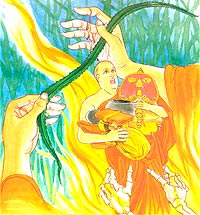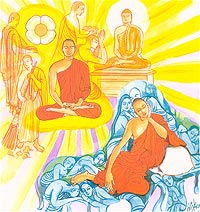|
23 08 2012 Thursday LESSON 685 FREE ONLINE eNālāndā Research and Practice UNIVERSITY
through
http://sarvajan.ambedkar.org
Tipitaka network … his life, his acts, his words
sabbe satta bhavantu sukhi-tatta
TIPITAKA  மூன்று கூடைகள்— The words of the Buddha புத்தரின் வார்த்தைகள்—Majjhima மத்திம Nikāya மூன்று கூடைகள்— The words of the Buddha புத்தரின் வார்த்தைகள்—Majjhima மத்திம Nikāya
நடுத்தரமான நீள அளவு திரட்டுகள் -Sabbāsava Sutta எல்லா களங்கங்களின் நெறி முறைக் கட்டளை ஆணை (contd)
Dhammapada Verses 311, 312 and 313 Dubbacabhikkhu Vatthu-
Verse
311. Wrong Monastic Life Leads To Bad States-Verse 312. Three Things
That Will Not Yield Good Results-Verse 313. Do Merit With Commitment
AWAKEN ONES WITH AWARENESS IN CHINA
Jiangxi
• Donglin Temple
TIPITAKA AND TWELVE DIVISIONS
Brief historical background
Sutta Pitaka
Vinaya Pitaka
Abhidhamma Pitaka
Twelve Divisions of Buddhist Canons
Nine Divisions of Buddhist Canons
Sutta Piṭaka
Buddha Vacana புத்த வசனா
Cavukatar/Tatākata/Ciṉa/Arhat/Piṭaka/A
Doctor/A Physician/Cātta/Argha/Cukata/Gautama/Kripacharya/kṣapaṇaka/
muṉaiva/cittārtta/Pungkava/The Supreme Deity/ A Guru/ Tamōpaka/Light
/Brightness/ The Moon/he Sun/one of the 1 vital airs , that which is
exhaled in yawning/ Mūrtti/The Body/Figure /Shape/A Form of
Deity/Tamōkkiṉa/The Fire God/Baghava/The Supreme
Being/Siva/Vishnu/Brahma/Muṉi/An Ascetic/A Devotee/A Hermit/
sage/Vinayaka
கலைநாயகர்/சாக்கியமுனிவர்/தயாகூர்ச்சர்/
சவுகதர்/புத்தர்/ததாகதர்/சினர்/அருகர்/பிடகர்/
சாத்தர்/மூர்த்தி/தேவன்/உருவம்/சுகதர்/கௌதமர்/க்ஷபணகர்/முனைவர்/சித்தார்த்தர்/புங்கவர்/குரு/தமோபகர்/
வெளிச்சம்/தமோக்கினர்/அக்கினி/சந்திரர்/பகவர்/வனவாசி/ஞானி/
கடவுள்/சிவன்/விஷ்ணு/பிரமன்/விநாயகர்
— The words of the Buddha புத்தரின் வார்த்தைகள்—
It
may be, Ananda, that to some among you the thought will come: ‘Ended is
the word of the Master; we have a Master no longer.’ But it should not,
Ananda, be so considered. For that which I have proclaimed and made
known as the Dhamma and the Discipline, that shall be your Master when I
am gone.
Sutta Piṭaka
நெறி முறைக் கட்டளை ஆணைக் கூடை
Sutta Pitaka (Sayings Basket) is the second of the three divisions of the Tipitaka (It is made up
of two words, ti means ‘three’ and pitaka means ‘baskets’.)
நெறி முறைக் கட்டளை ஆணைக் கூடை மூன்று கூடைகளில் மூன்று மண்டலங்களின் இரண்டாவதானது.
புத்தரின் தம்மாசம்பந்தமாக போதிக்கப்பட்ட கோட்பாடுகளின் இன்றியமையாத பொருள். அது பத்து ஆயிரத்திற்கும் அதிகமான நெறி முறைக் கட்டளை ஆணைகளை உள் அடக்கியுள்ளது. அது Nikāyas என அழைக்கப்படும் ஐந்து திரட்டுகளின் பாகங்களாகப் பிரிக்கப்பட்டுள்ளது.
Majjhima மத்திம Nikāya
நடுத்தரமான நீள அளவு திரட்டுகள்
— The discourses of medium length —
[ majjhima: medium ]
The Majjhima Nikāya gathers 152 discourses of the Buddha of intermediate length, dealing with diverse matters.
- Sabbāsava Sutta (MN 2) {excerpt} - plain texts
- The Buddha exposes here the different ways by which the
āsavas, fermentating defilements of the mind, are dispelled. This
excerpt contains a definition of what is yoniso and a-yoniso manasikāra.
MN 2 - (M i 6)
Sabbāsava Sutta
எல்லா களங்கங்களின் நெறி முறைக் கட்டளை ஆணை
Very interesting sutta, where the different ways by which the āsavas, fermentating defilements of the mind, are dispelled.
மிக சுவாரசியமான நெறி முறைக் கட்டளை ஆணை.இங்கு மனதை நுரைத்தெழச்செய்து கறைப்படுத்தும் asavas புலனுணர்வை
ஆட்கொண்ட மற்றும் மட்டுமீறிய சிற்றின்ப ஈடுபாடு, வாழ்க்கை பசி வேட்கை,
கனவுகள் நிறைந்த ஊகக் கோட்டை மற்றும் அறிவின்மை போன்ற இகழத்தக்க
செய்திகளை விரட்ட வேறுபட்ட வழிவகைகள் எவை என வெளிப்படுத்தல். இந்த
நுலிலிருந்து எடுத்த பகுதி ஒரு சொற்பொருள் விளக்கம் யாவையும் உட்கொண்டு
பாண்டியத்தியமுள்ள, மெய்யாக, வினாவுள்ள, தகுதியாக, கருதுதல்.
- Sabbāsava Sutta (MN 2) {excerpt} - plain texts
- The Buddha exposes here the different ways by which the
āsavas, fermentating defilements of the mind, are dispelled. This
excerpt contains a definition of what is yoniso and a-yoniso manasikāra.
- புத்தர்
இங்கு மனதை நுரைத்தெழச்செய்து கறைப்படுத்தும் asavas புலனுணர்வை
ஆட்கொண்ட மற்றும் மட்டுமீறிய சிற்றின்ப ஈடுபாடு, வாழ்க்கை பசி வேட்கை,
கனவுகள் நிறைந்த ஊகக் கோட்டை மற்றும் அறிவின்மை போன்ற இகழத்தக்க
செய்திகளை விரட்ட வேறுபட்ட வழிவகைகள் எவை என வெளிப்படுத்தல். இந்த
நுலிலிருந்து எடுத்த பகுதி ஒரு சொற்பொருள் விளக்கம் யாவையும் உட்கொண்டு
பாண்டியத்தியமுள்ள,மெய்யாக,வினாவுள்ள,தகுதியாக, கருதுதல்.
Atthi, bhikkhave, āsavā dassanā pahātabbā, atthi āsavā saṃvarā
pahātabbā, atthi āsavā paṭisevanā pahātabbā, atthi āsavā adhivāsanā
pahātabbā, atthi āsavā parivajjanā pahātabbā, atthi āsavā vinodanā
pahātabbā, atthi āsavā bhāvanā pahātabbā.
அத்தி, பிக்காவே, ஆஸவா தஸ்ஸனா பஹாதப்பா, அத்தி ஆஸவா ஸம்வரா பஹாதப்பா, அத்தி ஆஸவா பட்டிஸேவனா பஹாதப்பா, அத்தி ஆஸவா அதிவாஸனா பஹாதப்பா, அத்தி ஆஸவா பரிவஜ்ஜனா பஹாதப்பா, அத்தி ஆஸவா வினோதனா பஹாதப்பா, அத்தி ஆஸவா பாவனா பஹாதப்பா.
|
There are fermentations
to be abandoned by seeing, those to be abandoned by restraining, those
to be abandoned by using, those to be abandoned by tolerating, those to
be abandoned by avoiding, those to be abandoned by destroying, and those
to be abandoned by developing.
பிக்குகளே, நொதித்தல்களை பார்வையால் கைவிடப்படவேண்டி இருக்கிறது, சிலதை அடக்கி வைத்து கைவிடப்படவேண்டி இருக்கிறது, சிலதை கையாளுதலால் கைவிடப்படவேண்டி இருக்கிறது, சிலதை பொறுத்துக்கொண்டு கைவிடப்படவேண்டி இருக்கிறது, சிலதை அழிப்பால் கைவிடப்படவேண்டி இருக்கிறது, மற்றும் சிலதை வளர்ச்சியால் கைவிடப்படவேண்டி இருக்கிறது.
|
(Dassanā pahātabbāsavā)
தஸ்ஸனா பஹாதப்பாஸவா
Katame ca, bhikkhave, āsavā dassanā pahātabbā? Idha, bhikkhave, assutavā
puthujjano – ariyānaṃ adassāvī ariyadhammassa akovido ariyadhamme
avinīto, sappurisānaṃ adassāvī sappurisadhammassa akovido
sappurisadhamme avinīto – manasikaraṇīye dhamme nappajānāti,
amanasikaraṇīye dhamme nappajānāti. So manasikaraṇīye dhamme appajānanto
amanasikaraṇīye dhamme appajānanto, ye dhammā na manasikaraṇīyā, te
dhamme manasi karoti, ye dhammā manasikaraṇīyā te dhamme na manasi
karoti.
கதமே சா பிக்காவே, ஆஸவா தஸ்ஸனா பஹாதப்பா? இத பிக்காவே, அஸுத்தவா புதுஜ்ஜனோ - அரியானம் அதஸ்ஸாவி ஆரியதம்மஸ்ஸா அகோவிதோ ஆரியதம்மே அவினிதோ, ஸப்புரிஸானம் அதஸ்ஸாவி ஸப்புரிஸதம்மஸ்ஸா அகோவிதோ ஸப்புரிஸதம்மே அவினிதோ- மானஸிக்காரண்யே தம்மே நப்பஜானதி, அமானிஸிக்காரண்யே தம்மே அப்பஜானதோ, ஏ தம்மா நா மானஸிக்காரண்யா, தே தம்மே மானஸி கரோதி, ஏ தம்மா மானஸிக்காரண்யா தே தம்மே மானஸி கரோதி.
|
(Fermentations to be abandoned by seeing)
பார்வையால் கைவிடப்படவேண்டிய நொதித்தல்கள்
And what are the fermentations to be abandoned by seeing? There is the case where an uninstructed, run-of-the-mill person — who has no regard for noble ones, is not well-versed or disciplined in their Dhamma, who has no regard for men of integrity, is not well-versed or disciplined in their Dhamma — does not discern what ideas are fit for attention or what ideas are unfit for attention. This being so, he does not attend to ideas fit for attention and attends [instead] to ideas unfit for attention.
மற்றும் எந்த நொதித்தல்களை பார்வையால் கைவிடப்படவேண்டி இருக்கிறது? ஓர் அறிவுறுத்தப்படாத திரிகைப் பொறியமைவு ஓடிப்போ நபரின் நேர்வு - மேதக்கவர்களுக்கு அபிமானம் இல்லாதவர், நேர்மையான மனிதர்ளிடத்து அபிமானம் இல்லாதவர், எந்த எண்ணத்தையும் நுணுகிக் காண கவனம் செலுத்த அருகதை இருப்பது அல்லது அருகதை இல்லாதது என அவர்களின் தம்மாவை நன்குணராத அல்லது கட்டுப்பாடாடற்றவர். இது அப்படி இருத்தல், அவர் எந்த எண்ணத்தையும் நுணுகிக் காண கவனம் செலுத்த அருகதை இருப்பதை கவனிப்பதில்லை, மற்றும்
 |
Verse 311. Wrong Monastic Life Leads To Bad States
As blady grass when wrongly grasped
the hand does lacerate
so a mishandled monastic life
drags one off to hell.
Explanation: The blade of the kusa grass,
if held wrongly, will cut one’s hand. In the same way, if one were
to handle monastic life in the wrong way - against the grain - it will
pull the person down into hell.
|
 |
Verse 312. Three Things That Will Not Yield Good Results
Whatever of kammas slacks,
whatever of vows corrupt,
a faltering in the holy life
never brings ample fruit.
Explanation: Some act of merit may get committed
casually. The practice of religious rite may be tainted. Higher life may
get led dubiously. All these will not yield high results.
|
 |
Verse 313. Do Merit With Commitment
If there’s aught that should be done
let it be done then steadily,
in truth a slack monastic life
all the more stirs up the dust.
Explanation: If you do an act of merit do it with a sense
of commitment and concern. But, if the practice of monastic life is
casual, instead of reducing the dust, much dust will be smeared.
|
Dhammapada Verses 311, 312 and 313
Dubbacabhikkhu Vatthu
Kuso yatha duggahito
hatthameva’ nukantati
samannam dupparamattham
nirayayu’ pakadhati.
Yam kinci sithilam kammam
samkilitthanca yam vatam
sankassaram brahmacariyam
na tam hoti mahapphalam.
Kayira ce kayirathenam
dalhamenam parakkame
sithilo hi paribbajo
bhiyyo akirate rajam.
Verse 311: Just as kusa grass if badly held cuts that very hand, so also, the
ill-led life of a bhikkhu drags that bhikkhu down to niraya.
Verse 312: An act perfunctorily performed, or a practice that is depraved, or
a questionable conduct of a bhikkhu is not of much benefit.
Verse 313: If there is anything to be done, do it well; do it firmly and
energetically; for the slack life of a bhikkhu scatters much dust (of moral
defilements).
The Story of the Obstinate Bhikkhu
While residing at the Jetavana monastery, the Buddha uttered Verses (311),
(312) and (313) of this book, with reference to an obstinate bhikkhu.
Once, there was a bhikkhu who was feeling remorse for having unwittingly cut
some grass. He confided about this to another bhikkhu. The latter was reckless
and stubborn by nature, and he did not think much about committing small
misdeeds. So he replied to the first bhikkhu, “Cutting grass is a very
minor offence; if you just confide and confess to another bhikkhu you are
automatically exonerated. There is nothing to worry about.” So saying, he
proceeded to uproot some grass with both hands to show that he thought very
little of such trivial offences. When the Buddha was told about this, he
reprimanded the reckless, stubborn bhikkhu.
Then the Buddha spoke in verse as follows:
Verse 311: Just as kusa grass if badly held cuts
that very hand, so also, the ill-led life of a bhikkhu drags that
bhikkhu down to niraya. |
| |
Verse 312: An act perfunctorily performed, or a
practice that is depraved, or a questionable conduct of a bhikkhu is
not of much benefit. |
| |
Verse 313: If there is anything to be done, do it
well; do it firmly and energetically; for the slack life of a bhikkhu
scatters much dust (of moral defilements). |
At the end of the discourse the reckless obstinate bhikkhu realized the
importance of restraint in the life of a bhikkhu and strictly obeyed the
Fundamental Precepts for the bhikkhus. Later, through practice of Insight
Meditation, that bhikkhu attained arahatship.
Jiangxi
• Donglin Temple
http://en.wikipedia.org/wiki/Donglin_Temple_%28Jiangxi%29

Main hall of the Donglin Temple
The Donglin Temple (simplified Chinese: 东林寺; traditional Chinese: 東林寺; pinyin: Dōnglínsì; literally “East Wood Temple”) is a Buddhist monastery approximately 20 kilometres (12 mi) from Jiujiang, Jiangxi Province, People’s Republic of China. Built in 386 CE at the foot of Lushan by Hui-yuan, founder of the Pure Land Sect of Buddhism, it is well known for how long it has stood without collapsing.
The monastery reached its peak of influence during the Tang Dynasty (618–907 CE), but was severely damaged during the Taiping Rebellion and was almost destroyed during the Republican
period (1912–1949) of Chinese history. It currently houses a small
community of monks supported by a small farming village in the immediate
vicinity.
Various other places are named for the temple, including Donglin Academy 東林書院 and Tōrin-in 東林院.
Gallery
-
-
A distant view with peasants working in the foreground
-
Donglin temple lotus pond
-
-
Donglin temple arhat hall
|









